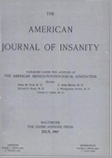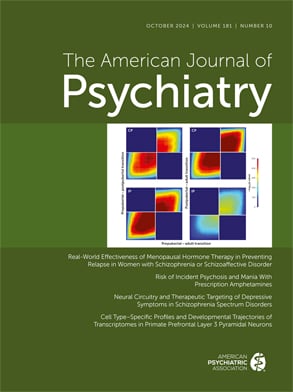Abstract
In comparing the first five cases we note in all a poor family background in which neurotic tendencies and intemperance figure prominently. In Case I, the father was sent to prison for some moral offence and the sister is physically stunted and nervous. Case II, the father, paternal aunt and brother were very nervous.
Case III shows the father possibly syphilitic, forgetful at 54 and mother fussy and nervous.
In Case IV the father had an attack of depression from which he recovered; one paternal uncle, maternal grandfather, one maternal uncle and maternal cousin were intemperate.
Case V. Father very intemperate and immoral; mother weak, lacking in stamina. The social status varies from poor to welll-to-do but on the whole is of a fair average.
The age at which the patients came under observation varied from 25 to 35; one patient was married, the others were single. In disposition they were characterized as "quiet and reserved." "Quick-tempered and very sensitive," and "seclusive and obstinate," while nothing could be obtained in regard to the other two.
All gave a history of bad mental and moral hygiene. In three we have a history of masturbation, commenced at 6, 9 and 14 years of age respectively. In one case the practice was denied but there were evidences of the habit and in one there was neither history nor evidence. In four of the cases we obtain a history of the patients sleeping in the parents' bed until at least five years of age; in one case until 10, in another until 7 and in one until 12. In the fifth case incestuous relations between the father and sister were witnessed at 10.
It is rather interesting to note, that in several instances the earliest symptoms are dated back to five years of age.
Case I had anxiety dreams and hallucination of sight at 5.
Case IV saw father's genitalia at 5, commenced to ruminate about them and the vision of these organs later became an obession.
Case III complained of a lump in her throat when between 4 and 5 years of age and for three months could not eat any solid food. This symptom recurred in exactly the same way at 21.
In three cases we have a fear of the father; in two this fear developed at puberty.
In two we have fear of touching the father's body after death. Physically we have a variation from frail to excellent and three had enlarged thyroids.
As regards diagnosis two might be classed as psychæesthenias, one as allied to manic depressive insanity and two as præcox but it seems to me that we have in all of the cases essentially the same mechanism; that they are all really of the præcox type because they all show a more or less shut-in personality, a living for self without any real altruism or self-forgetfulness and a consequent inefficiency. From earliest childhood they appear to have a special affinity for sexual matters and their interest centers around these rather than around the other influences of life. On this account too, they are probably so subject to traumata. It is not a question of one, two or even more traumata, but it is essentially a faulty habit of mind.
One case showed a strong homosexual trend and none showed a well rounded sublimation of the sexual instinct.
It is rather interesting that the five patients happen to be Protestants—two Lutheran, two Presbyterian and one Baptist. Dr. Freud's cases belonged principally I take it to the Hebraic religion, and it would be interesting to know whether Catholics are as subject to this particular reaction type or whether perhaps the early habit of confession, commenced in their church, I understand, at about 8 years of age, straightens out some of the symptoms by ventilating their thoughts. In Catholics we find of course frequently the identification with the Virgin Mary, etc., possibly a homosexual complex.
Case III shows very conclusively why gymecological operations in these cases are frequently unsuccessful. The underlying complex is not modified by the operation and is even as in this case often made worse. That neither bad heredity nor faulty physical development, like enlarged thyroid, are causes of the disease is shown by the fact that one or both are found in one or the other of the contrast cases. That the faulty mental hygiene in early childhood is not the exclusive factor is demonstrated by Case VI where we have with similar factors a different type of reaction, not a father complex. However the faulty hygiene acted here also as a grave emotional trauma which prevented a normal adjustment in early adult life. We have then still to admit that there appears to be something else inherent in the individual to bring about this type. We realize the truth of what Bleuler says about paranoia, namely, that "In the majority of cases of paranoia there is a constitutional predisposition plus a chain of Freud's predisposing occurrences and that with the same physical and mental trauma, one person develops an incurable psychosis, another a transient hysteria, another a momentary fright."
There is no question in my mind about the help that Freud has given us in dealing with these cases especially in the less pronounced types. In this connection I would like to cite the case of a nurse who while in training was considered somewhat peculiar and antisocial but otherwise of a very good intelligence. Some time after taking up work in a distant city, she wrote me a letter on the eve of a serious operation, in which she confessed to homosexual thoughts towards a certain woman. She felt this mental state as a disgrace, felt that she would lose her reason if she had to live in this way and hoped that she would die during or as a result of the operation. I was at a loss to know just what to do to help her at this distance but finally wrote her a long psychoanalytical letter in which I told her that while hers was a most unfortunate condition it was not a disgrace but rather a disease which was encountered not infrequently by alienists. That it was usually traceable to certain traumata or faulty factors of mental hygiene in early childhood—explaining to her what these factors were— and that if she would trace back her life she would probably find something to account for that particular type of development in her own case, that although it was a misfortune, it was her duty to try to work out of it and I then laid out a reconstruction plan of her life in which altruistic factors formed a prominent part.
I did not hear from her after that for a year and a half when she wrote me a very wholesome, sane letter in which she stated that she had just successfully passed a certain examination for which she had been working. That now she would have a certain amount of time at her disposal outside of her work and she asked me to outline some study with which she might fill this time. At the end she thanked me for my letter which was the only reference she made to the subject. I thereupon mapped out for her three different lines of work, either one of which would keep her busy for several years.
In this case the self analysis with the aid of the clue given her, was possibly more effectual than a prolonged analysis with the physician would have been.
While we can do but comparatively little with the fully developed cases since they appear essentially satisfied with their abnormal trend and only put forth a makebelieve effort now and then, it should be possible through the knowledge of these facts to do something along the line of prevention among children judging from the comparative success in the milder adult cases.

